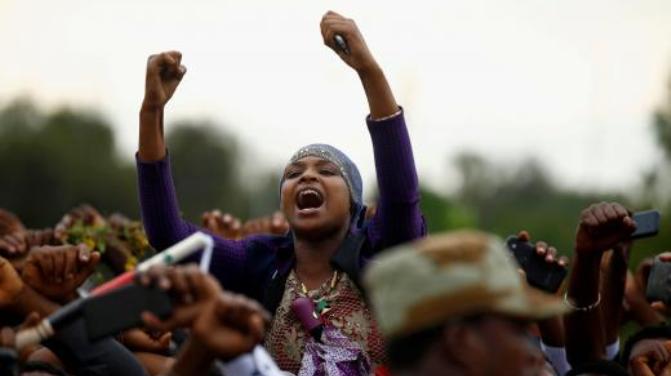CPJ accuses Ethiopia of intensifying press crackdown

By Tesfa-Alem Tekle
November 19, 2016 (ADDIS ABABA) – A press freedom campaigner group has accused Ethiopia of intensifying crackdown on media under the recently imposed state of emergency.
Last month, Ethiopia declared a six-month state of emergency after a wave of deadly anti-government demonstrations in Oromia and Amhara regions.
The New York based group, the Committee to Protect Journalists (CPJ) said the Horn of Africa’s nation has arrested or sentenced at least three journalists and bloggers under a state of emergency since October.
“In recent weeks, Ethiopian authorities have jailed a newspaper editor, as well as two members of the award-winning Zone 9 bloggers’ collective, which has faced continuous legal harassment on terrorism and incitement charges” CPJ said in a statement extended to Sudan Tribune.
“A fourth journalist has been missing for a week; his family fear he is in state custody” it added.
The rights group urged the Ethiopian government to immediately release all journalists detained.
CPJ said Ethiopia’s Supreme Court on has continued hearing prosecutors’ appeal of a lower court’s on November 15 after acquittal of four bloggers from the Zone 9 collective on terrorism charges.
Getachew Worku, the editor-in-chief of independent weekly Ethio-Mihidar, was sentenced to a year in jail on Tuesday for “defamation and spreading false information”
According to CPJ Getachew ‘s arrest was in connection with an article he published in the newspaper alleging corruption in a monastery .
Abdi Gada, an unemployed television journalist, has not been seen since November 9.
His family and friends however fear that he might be in state custody.
The two arrested bloggers are Befekadu Hailu a co-founder of the Zone-9 collective, and Natnael Feleke, whose Zone 9 group has written about political repression, corruption and social injustice.
Authorities have not yet announced any new charge against befekadu.
The Africa News Agency quoted Befekadu’s friends saying that they believed he may have been arrested following an interview he gave to the U.S.-government-funded broadcaster Voice of America’s Amharic service, in which he criticized the government’s handling of the protests.
Befekadu was freed from jail in October 2015 after 18 months behind bars accused of “inciting violence” with his anti-government writing. He was rearrested last month.
Feleke was also detained for several days in October, before being released with a caution.
According to right groups the Ethiopian government keeps critical journalists under a tight rein and close control.
“Silencing those who criticize the government’s handling of protests will not bring stability,” CPJ Africa Program Coordinator Angela Quintal said from New York.
“The constant pressure on Zone 9 bloggers with repeated arrests and court appearances is clearly designed to intimidate the remaining independent journalists in Ethiopia”
Ethiopia ranked fourth on the CPJ’s list of the 10 most censored countries in 2014, and is the third-worst jailer of journalists in Africa, according to the group’s “prison census”
Since last year the east African nation has faced an unprecedented wave of violent protests that claimed the lives of over 500 people.
But the country’s most recent protests were sparked after a religious festival in Oromia region turned into violet anti-government protests claiming lives of 55 in stampede.
After the protests spread to many parts of the country, Ethiopia imposed a six-month state of emergency to contain the protests which were spreading to many parts of the country.
The protests first erupted over demands for land rights however later turned in to calling for increased political and economic rights.
On November 12, Ethiopia’s State of Emergency Inquiry Board – in a televised statement – announced that authorities have arrested 11,607 people after the state emergency decree.
(ST)
